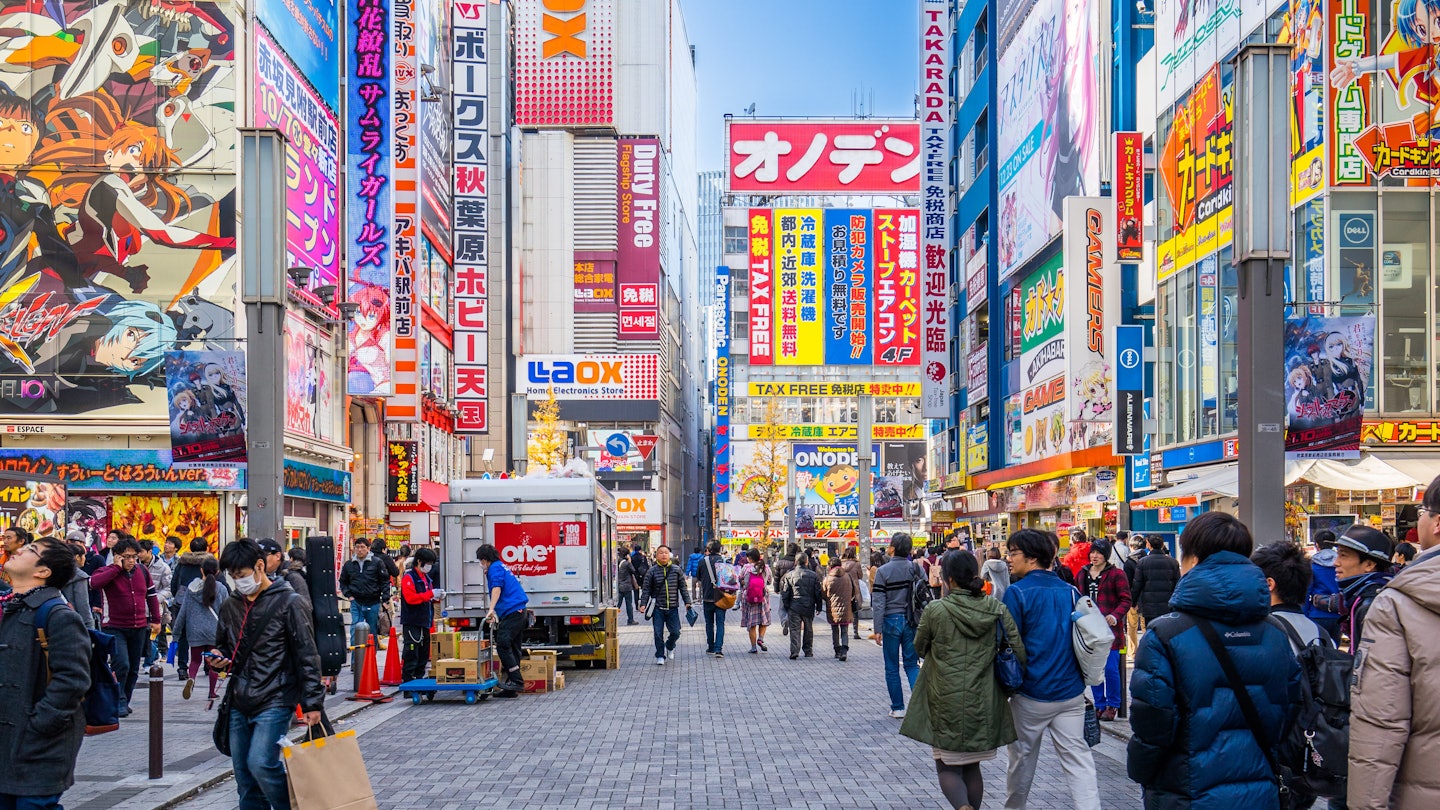
The 30 best countries, cities and regions to visit in 2025
Jul 16, 2010 • 3 min read

Akihabara draws shoppers looking for all-things electronic. easy camera / Shutterstock
From multistorey computer stores and back-alley discount camera shops to anime-themed cafes and the latest in cosplay fashions, Akihabara is Tokyo's epicentre for electronic goods and otaku (geek) culture. If that's your scene, odds are the neighbourhood is already on your radar. Not for you? Think again – Akihabara might surprise you.
For a long time 'Akiba' – as the neighbourhood is known to locals – was something of a niche destination. But in the years since otaku culture went mainstream (and global), its star has skyrocketed and a visit to Akihabara has become something of a Tokyo staple.

So what exactly does it mean to be an otaku? At a general level, an otaku is a person displaying an obsessive interest – a fanboy or fangirl. In reference to Akihabara, though, the obsessions in question are anime, manga (Japanese comics) and video games. While admission of geekdom once carried a negative connotation, the otaku movement is currently enjoying a global renaissance. One prominent example is the former Japanese Prime Minister Taro Aso, who proudly admitted his love of manga to journalists, and included the promotion of this culture on his foreign policy agenda.
Akiba is full of shops that sell not just manga and anime DVDs but all the components of the subculture: cel art, character figurines, models and cosplay costumes and wigs. See what we're talking about at pilgrimage spot/shop Mandarake Complex.
But Akiba's otaku aren't just consumers; they've created their own culture as well. Take maid kissa – cafes where the wait staff dress in French maid costumes and speak to customers in deferential tones – for example. ('Kissa’ is a short form of the Japanese word for coffee shop, kissaten.) While these were likely intended for stereotypically awkward otaku customers, maid kissa (and maids!) have since become part of the pop-culture fabric. You can get the maid kissa experience at always popular @Home Cafe.

With its electronic bells ringing with inimitable sound and fury and frenetic street scenes of lights and beeps, Akiba can feel a bit like being inside a video game. And one easy way to connect with otaku culture is through gaming – especially of the vintage kind. Some travellers of a certain age will no doubt have fond memories of playing old Sega and Nintendo games. Relive the magic at retro arcade Super Potato Retro-kan, where you can play good ol' PacMan and Street Fighter (or introduce them your kids).
Proving that cosplay and gaming have more of a mainstream appeal than, really, anyone expected is Maricar – Tokyo's latest, biggest traveller trend. Maricar runs tours around the city on go-karts (yes, go-karts on city streets!) and on top of that they have racks of costumes to loan out. Naturally, the Mario and Luigi ones, from Nintendo's iconic Super Mario Bros. series are the most popular.
Before Akiba was known as an otaku hangout it was known as Denki-gai – 'Electric Town'. In the chaotic postwar days, a black market for radio parts went up here. From there it was household appliances and, later, computers – and especially computer parts. Akiba's original obsessives came here in search of components to build their own PCs. The beating heart of the neighbourhood's original DIY community remains the Akihabara Radio Center, a two-storey warren of fifty-plus electronics stalls that lies under the elevated railway.
For the rest of us, there's Yodobashi Akiba, a mammoth shop for photography equipment, mobile phones, televisions, household and beauty appliances – really anything that runs on power. Here, as in every major electronics store in the neighbourhood, duty-free shopping is possible, so have your passport ready.
Has Akiba gone too mainstream for you? Check out the far less flashy scene at Nakano Broadway, home to the original Mandarake Complex.
The JR Yamanote, JR Sobu and Keihin-Tohoku train lines all stop at Akihabara. The Hibiya subway line stops a bit east of the main electronics neighbourhood. Get advice and pick up a map of the area at the helpful Akiba Info desk, inside the Tokyo Anime Centre shop.
Last updated in March 2018
Plan with a local
